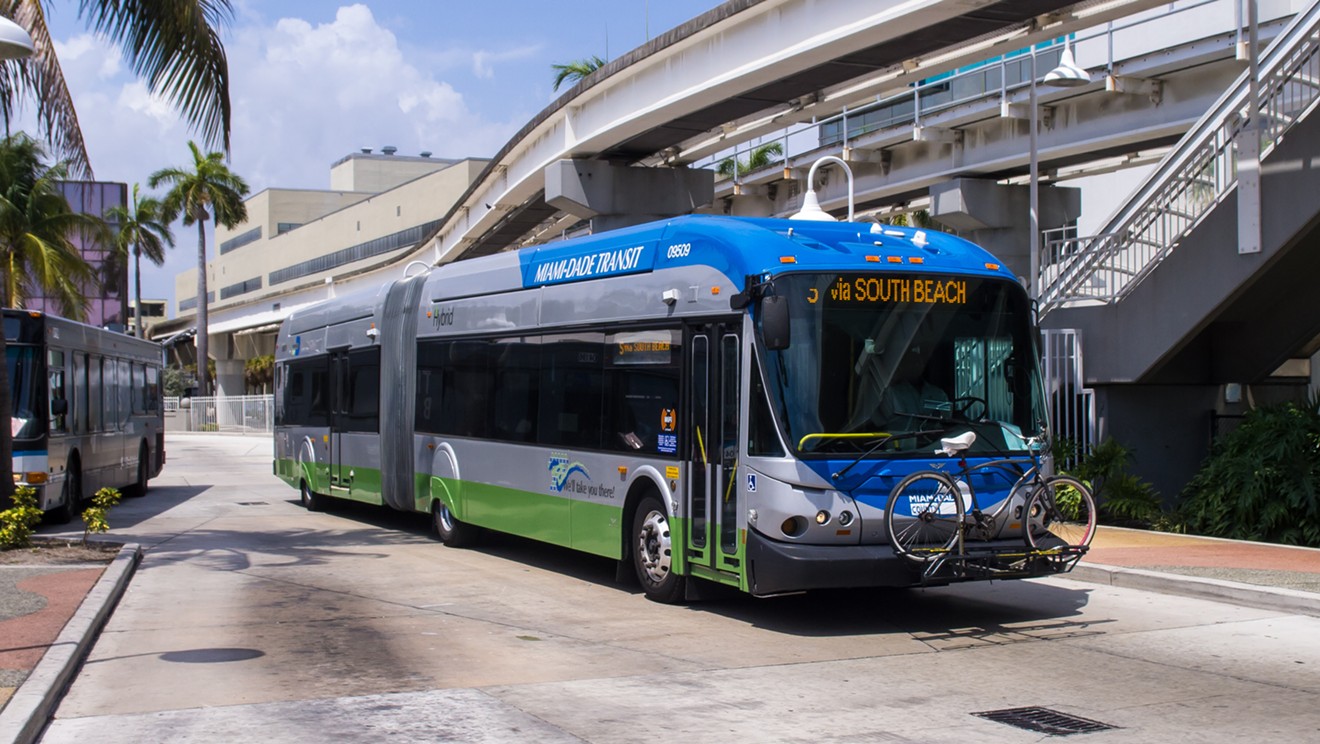On the evening of March 9, a man and woman riding a Miami-Dade Transit bus were having a conversation without wearing masks.
That made Lai, a Miami resident of Chinese descent, uncomfortable. She waited several minutes, not wanting to interrupt their conversation. Then she asked them politely to please cover their faces. The woman, who had a bandanna around her neck, refused and said she couldn't breathe with a mask on.
"I justified it by saying, 'Ma'am, I've been working about six hours and wore my mask all day, and I think we have to be courteous to one another,'" Lai tells New Times. "My dad is 76, and I can't afford to bring COVID home."
The two conversing passengers, a white woman and a Black man, still refused to put their masks on. So Lai, who asked New Times that only her first name be published because she fears the recent wave of anti-Asian sentiment, asked the driver to enforce the rule. That's when things took a turn.
"The man started calling me a 'chink' and a 'gook' and all these racial slurs that I haven't heard in a very long time," she says.
In shock, Lai grabbed her phone to record the incident, fearing it might turn physical.
As the video starts, the man, who was wearing a disposable mask around his chin, said he had no problem with what Lai was saying but was upset that she was recording him.
He then walked toward the bus driver and asked to be dropped off at the next stop. He said something unintelligible, and then Lai told him, "Maybe you don't need to be racist to me."
"I don't give a fuck what you saying, man," he responded. "I got daughters older than you. Mind yo' goddamn business, Chinese lady. Ugly-ass chink. Mind yo' goddamn business, man."
The exchange grew heated, and the man continued calling Lai names.
"I don't care about you peoples, man. Go to hell, dog. This America, Jap," he continued.
When Lai responded that she is American, the man continued to berate her and gave the camera a middle finger.
"Smile for the camera," he said. "Smile for this chink."
The insults continued. Before getting off the bus, he told her: "Fuck your culture."
During the nearly three-minute exchange, none of the other passengers intervened or spoke up. Lai says she heard one person laugh.
Afterward, Lai reported the incident to Miami-Dade Transit and to the Miami-Dade State Attorney's Office. She says a prosecutor told her the incident wasn't a hate crime because no crime was committed under the law.
"No physical violence occurred," Lai says. "I'm glad and lucky that it was only verbal harassment because a lot of things have happened to more vulnerable people."
A spokesperson from the State Attorney's Office told New Times that while Florida law allows prosecutors to add enhanced penalties for crimes that involve discrimination, the state does not have standalone charges for hate crimes.
Miami-Dade Transit says it has reviewed the video footage from the bus and is conducting an internal investigation, which may include re-training for the bus driver.
"The safety and wellbeing of our passengers and employees is our number one priority. We regret any of our passengers having had a negative experience while on our system," the transit department said in a statement. (Transit's full statement can be found at the bottom of this post.)
The incident on the bus comes amid a reported rise in anti-Asian crimes in the U.S. Most recently, a 21-year-old white man went on a shooting rampage at three Atlanta-area massage parlors and killed eight people, six of whom were of Asian descent. Police have said the gunman is a sex addict who explained that he wanted to eliminate his temptations. But the killings occurred amid a rise in anti-Asian racism and attacks that have marked the pandemic.
Stop AAPI Hate, a nonprofit that tracks incidents of hate, discrimination, and violence against Asian-Americans and Pacific Islanders in the U.S., received nearly 3,800 reports of hate incidents from March 19, 2020 to February 28, 2021.
"The number of hate incidents reported to our center represent only a fraction of the number of hate incidents that actually occur, but it does show how vulnerable Asian-Americans are to discrimination, and the types of discrimination they face," the report says.
According to the organization, 68 percent of those who made reports experienced verbal harassment, and 20 percent said they've been avoided by others on the basis of their race. Eleven percent reported being physically assaulted; 8 percent reported civil-rights violations, such as workplace discrimination and refusal of service; and 6 percent reported being harassed online. Women were twice as likely as men to report such incidents, the report says.
The day after the Atlanta-area shootings, an elderly Asian woman was attacked in San Francisco. She was able to fight back, and sent her attacker to the hospital. In an interview with CBS San Francisco, she said she was "very traumatized, very scared" and that one of her eyes was still bleeding.
Before that, on February 3, someone slashed a 61-year-old Filipino-American man's face from ear to ear on a New York City subway. No one helped him.
Asian-American communities have been sounding the alarm about an increase in violence and hate against members of their communities since the onset of the COVID-19 pandemic. It didn't help that the previous U.S. president demonized Asians, and especially Chinese people, throughout his administration. Former president Donald Trump had a history of calling the coronavirus the "China virus" and the "kung flu."
The Miami-based Asian Pacific American Bar Association of South Florida says such rhetoric has only encouraged racist attitudes and violence.
"Use of divisive rhetoric like 'Chinese virus' and 'Kung flu' only serve to exacerbate the idea of Asian-Americans as perpetual foreigners and to embolden the individuals who commit these acts," the organization says on its website.
Lai says she was worried about coming forward with her story.
"I don't want any retaliation," she says. "Maybe this goes with the Asian upbringing of keeping a low profile, but I really do want to raise awareness. I've only told a few people because I don't want to rock the boat. There are people experiencing situations that are more difficult."
Lai says she's accustomed to microaggressions and verbal harassment from people who are prejudiced against Asian-Americans. When she was in the eighth grade in Miami, she took a tour of a high school and visited a home-economics class. One of the students said to her, "Oh, you came to cook us fried rice."
"Every single kid laughed," Lai says. "So did the teachers."
She says she hasn't yet told her parents about what happened on the bus, but they recently had a talk with her about lying low and not going out unless she needs to. They want her to stay home unless she's at work.
"There's a great deal of pain and fear that the Asian-American community is facing right now, and it needs to be addressed," Lai says. "Not with words, but with actions."
Lai used to do community organizing around election time. She says she believes those type of organizations can be more inclusive in their activism.
"Real activism and real work isn't real if it doesn't include [speaking out against] anti-Asian hate and rhetoric," she says. "It's not a competition about which race suffers more or has it worse. We need to include all marginalized people. From what I have seen, we have to stand up. We can't just be bystanders. We have to protect our friends, our family each other speak up and just be vigilant."
"I think the issue with a lot of grassroots organizations is that they think their issue is very singular, but a lot of our movements are very intersectional," she continues. "A lot of things like race and misogyny aren't mutually exclusive. I think just creating a space for Asians to voice their stories and their opinions is a good starting point."
Statement from Miami-Dade Transit, March 20, 2021:
The safety and wellbeing of our passengers and employees is our number one priority. We regret any of our passengers having had a negative experience while on our system.
The Department was first made aware of this incident on March 10, 2021 and received the video files from the bus on March 19, 2021. An internal review is being conducted, and appropriate action will be taken, which may include re-training.
Miami-Dade operators receive conflict resolution and diversity training. Passengers are encouraged to immediately report incidents through the Transit Watch section of the GO Miami-Dade Transit app, by reporting it to the bus operator, or calling 911.
Miami-Dade Transit follows all state, federal, and CDC COVID-19 requirements, and passengers are required to wear masks while riding on public transit.
"Hate speech has no place in our community, period. We must stand together to condemn all forms of bigotry and hatred, as we confront the rise of violence against Asian-Americans. We all have a role to play in making sure Miami-Dade is a place where all people feel safe, welcome, and accepted," said Miami-Dade County Mayor Daniella Levine Cava.












